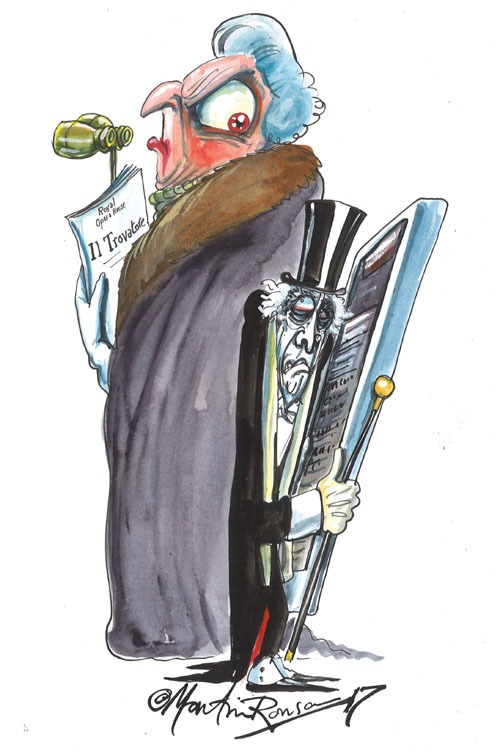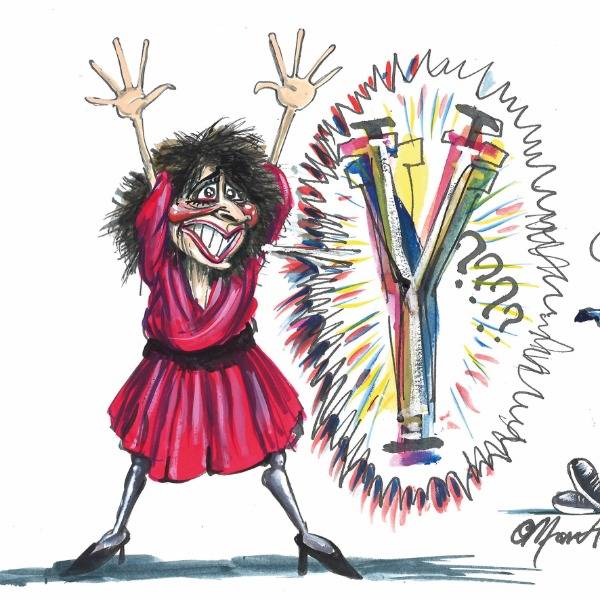
This article is a preview from the Spring 2017 edition of New Humanist. You can find out more and subscribe here.
"Is the cloakroom downstairs?”
“What tickets do you hold, sir?”
“Stalls.”
“Just stalls?”
“No, no, they’re orchestra stalls.”
“In that case, sir, you should use the special cloakroom. It’s very fast. If you’re in the ordinary downstairs cloakroom you may have to wait for up to half an hour after the performance to retrieve your coat.”
I’d been to the Royal Opera House in Covent Garden once before when I was a drama student in the 1960s. Back then I’d ignored the cloakroom and sat on my duffel coat so as to get a better sight of Don Giovanni from my restricted-view seat in the balcony. But tonight was different. Buoyed by two successive Premium Bond wins and a tax rebate, I’d decided to blow the lot on a grand operatic outing.
It was quite a decision. There was not only the material pain of forking out over £200 for a seat eight rows from the stage but also the ideological cost of indulging in a practice that would mark me out to fellow sociologists as someone desperately anxious to acquire a little cultural capital.
When Pierre Bourdieu first introduced that concept as way of accounting for the manner in which the upper classes maintained their position, he instanced an easy-going familiarity with the metropolitan opera house as a perfect example of this new form of status. Of course, that meant going the whole hog. There was little cultural capital to be found up in the balcony or among those required to stand in line to use the downstairs cloakroom.
The whole hog at Covent Garden meant far more than a seat in the orchestra stalls and a privileged coat hanger. As I discovered on the Royal Opera House website, you also needed to book dinner in one of the three restaurants. And as I also learned, you didn’t dine after the show. Oh no. You eat your way through three courses in between watching the opera. So, although the performance of Il Trovatore didn’t kick off until 7.30, by 6.15 I was already eating my first and second courses in the Balconies Restaurant.
As I munched my first course of marinated quails I realised how much further I needed to go to acquire that precious cultural capital. My first solecism had been to read the opera synopsis over my meal. Although all my fellow diners had individual copies of the £7 programme, they seemed to make a point of not reading them. Why bother? Didn’t everybody know the plot of Il Trovatore?
Neither did anyone glance at a watch. While I was stuffing my food down me so as not to miss the start of the show, my fellow diners were simply dining. They were out for a meal, not grabbing a snack before curtain up. Even when there were bursts of music over the PA system and terse announcements that the show would be beginning any minute now, their attitude suggested that they somehow knew that there was no way the opera was going to start without them.
What these people had was a sense of entitlement. They were with their own kind in their own kind of place. They settled into their seats as though sinking into familiar armchairs. They clapped at the end of arias with the sort of elegant patronage that they no doubt brought to bear upon their servants and chauffeurs. They ate delicately, drank modestly, tipped lavishly and never said more than a couple of words about the production. Going to the opera for these people was so much part of everyday life that it required no more critical analysis than would be accorded to the boy who delivered the morning Daily Telegraph.
As I settled into my seat for the final acts, I quickly checked my phone for messages. To judge by the consternation around me, I might as well have pulled a pin from a hand grenade. “Phone!” said the very fat man in the next seat to me. “Phone!” said his wife, leaning across her husband to make herself more audible. An elderly velvet-sheathed lady in row F turned round to check the cause of the trouble. She watched for a second as I scrambled to switch my phone to mute. I looked up and caught her beady eye. “Sorry,” I said, like a maid who had dropped the sugar tongs. She turned back and even as the conductor took his place in front of the pit orchestra I heard her say just two words to her immediate neighbour: “More tourists.”

